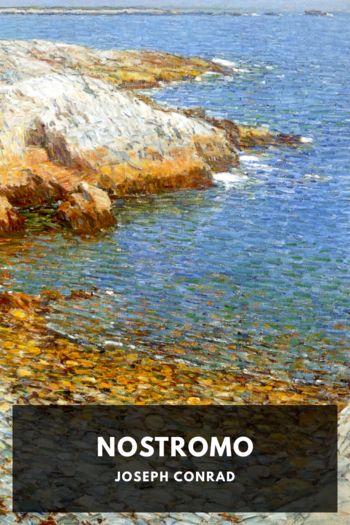Whoever Fears the Sea by Justin Fox (essential reading .txt) 📗

- Author: Justin Fox
Book online «Whoever Fears the Sea by Justin Fox (essential reading .txt) 📗». Author Justin Fox
CHAPTER 14
The next box to tick on Paul’s research agenda was dhow construction. One morning at spring low tide, he climbed down the foreshore stairs to stroll among the vessels that lay stranded like beached whales. Crews took the opportunity to paint, oil, caulk and tend to rigging on the sand. The tropics are not kind to wooden boats and their undersides need regular treatment for teredo worm, while their upper works also require a coating of shark oil and paint.
The end of the beach, where the sand was hard and the high tide did not gather for long, served as a repair yard. Paul spent hours photographing details, noting characteristics and speaking to sailors. He loved the dhow names carved in the bows and transoms: Asakher, Muscat, Al-Iman, Nashikuru.
He got talking to a first mate called Zahir who was overseeing the work on a dhow tied up in front of the customs house. ‘If you treat it well, a mashua lasts twenty-five years, maybe more,’ he said, pushing back a straw hat and wiping his brow. ‘But we sail them hard and the sun, the humidity, the sea animals, they all eat away its life.’
‘What’s this decoration?’ asked Paul, pointing to a wooden strip on the prow painted green and carved with arabesques.
‘That is the boat’s moustache. We have many patterns — flowers, birds, lions.’
‘And the round one?’ said Paul, pointing to a circular carving painted with a crescent moon and star.
‘That is the jicho, the eye,’ said Zahir. ‘A ship must not be blind, you understand. How can I say? The eyes are like a protection that helps the dhow to see danger.’
Paul wanted to arrange for the film crew to shoot a vessel under construction. He’d heard there were yards at Matondoni on the west coast of Lamu and at Kizingitini on Pate. Of course, the prize would be to visit the dhow-building village of Galoh in southern Somalia, where the mtepe had supposedly been found, but that seemed an impossibly long shot. Matondoni, at least, was close by.
On the appointed morning, a certain Captain Jabari collected Paul from Sunsail and led him to the dhow taxi Angalia, tethered to a rusty cannon. The inscription Keep smile, one love, I can’t forget you was painted in the bows along with a yin-yang sign. Angalia was a rougher, more workmanlike mashua than Fayswal, but she had decent lines and looked fast.
The moment Paul stepped aboard, the crew cast off with much jovial shouting and a flogging sail was swiftly sheeted in. Captain Jabari called for an immediate gybe, only narrowly missing an anchored dhow. One teenager jumped on to the foredeck apron, others grabbed the preventer and mainsheet as they swung the yard, sheeting in on the port tack without losing much way. They were a handy crew and told Paul, on several occasions within the first fifteen minutes, that Angalia was one of the fastest dhows in Lamu.
‘I’ve rigged a big, eight-and-a-half-panel sail,’ said Jabari, his arm resting on the tiller and a big hat pulled low over his eyes. Most sails, the skipper explained, were made of seven cotton panels. During races, or when the winds were particularly light, captains added sections of wood to lengthen their yards and bent larger sails. ‘In light winds, we can beat any mashua.’
‘What’s your secret?’ asked Paul.
‘Magic!’
No self-respecting nakhoda, Captain Jabari told him, would enter a regatta without ‘medicine’ and ‘counter-medicine’ for his vessel. Nakhodas and owners sought the help of magicians, either evil wachawi or waganga medicine men; before a race, sentries were posted to guard dhows from the application of evil charms.
‘Medicine can win you a regatta,’ said Captain Jabari, bearing off slightly to avoid a floating log. ‘We all saw it once, right here in Lamu Channel. The nakhoda of one dhow took some uchawi and threw it at the other jahazi. As soon as it touched the deck, the mast broke and the sail crashed down. Everyone in town was watching.
‘Of course, there is also good magic. We have a famous story of a race between the jahazis, Ikbal and Roshani, of two different merchant houses. The owner of Ikbal — his name was Said Ahmed — laid down a challenge. He walked to the office of his rival. As he entered the building, Said saw an axe next to the door and cried out, “I challenge you to a race from Lamu to Mombasa! If you win, you can take this axe and chop my dhow into pieces.”’
The captain explained that Said then went to one of the sharifs, who prepared a spell to protect Ikbal. Two days later, a racing fleet set off from Lamu. Ikbal and Roshani soon took the lead, sailing side by side down the channel towards Shela. There was almost a collision and something was thrown from Roshani which landed in Ikbal’s hold. Nothing happened. The mast didn’t break. The wind didn’t betray them. The Lamu crew were joyful. Roshani’s black magic had not worked.
But the uchawi was apparently a new, delayed-action variety. It took effect later, when the dhows were nearing Ziwayu Rocks. There was a loud crack and some of the rigging came adrift and fell into the sea. Roshani sailed on and the rest of the dhows overtook Ikbal. Her nakhoda broke down and wept while his crew tried to repair the damage. It took them eight hours.
‘Now his only hope was the charm,’ said Captain Jabari. ‘It was in two parts. A liquid, which he splashed on the foredeck. And a kind of powder, which he burnt in the bows.





Comments (0)